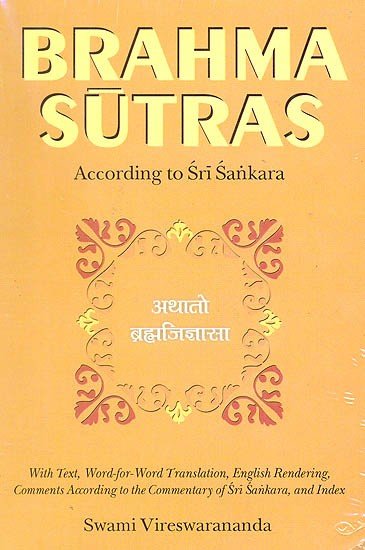Brahma Sutras (Shankara Bhashya)
by Swami Vireshwarananda | 1936 | 124,571 words | ISBN-10: 8175050063
This is the English translation of the Brahma-sutras including the commentary (Bhashya) of Shankara. The Brahma-sutra (or, Vedanta-sutra) is one of the three canonical texts of the Vedanta school of Hindu philosophy and represents an early exposition the Vedantic interpretation of the Upanishads. This edition has the original Sanskrit text, the r...
Chapter III, Section IV, Adhikarana VI
Adhikarana summary: Nevertheless works prescribed by the scriptures are useful as they are an indirect means to Knowledge
Sutra 3,4.26
सर्वापेक्षा च यज्ञादिश्रुतेः, अश्ववत् ॥ २६ ॥
sarvāpekṣā ca yajñādiśruteḥ, aśvavat || 26 ||
sarvāpekṣā—There is the necessity of all works; ca—and; yajñādi-śruteḥ—for the scriptures prescribe sacrifices etc. (as means to Knowledge); aśvavat—even as the horse.
26. And there is the necessity of all works, for the scriptures prescribe sacrifices etc. (as means to the attainment of Knowledge, though they are unnecessary for the attainment of its results, viz. Liberation), even as the horse (is used to draw a chariot and not for ploughing).
From the previous Sutra we may conclude that works are altogether useless. This Sutra says that all these works are useful, and that even the scriptures prescribe them, since they serve as a means to Knowledge. But they have no part in producing the result of this Knowledge, viz. Liberation. It comes only from Knowledge and not from work. Work purifies the mind, and the knowledge of the Self is manifested in such a pure mind. So works have a place as a means to Knowledge, though an indirect one.
Sutra 3,4.27
शमदमाद्युपेतः स्यात्तथा’पि तु, तद्विधेस्तदङ्गतया तेषामवश्यानुष्ठेयत्वात् ॥ २७ ॥
śamadamādyupetaḥ syāttathā’pi tu, tadvidhestadaṅgatayā teṣāmavaśyānuṣṭheyatvāt || 27 ||
śama-damādi-upetaḥ syāt—One must possess calmness, self-control, and the like; tathā api—even if it be so; tu—but; tadvidheḥ—since they are enjoined; tadaṅgatayā—as helps to Knowledge; teṣām-avaśya-anuṣṭheyatvāt—and therefore they have necessarily to be observed.
27. But even if it be so (i.e. even though there is no injunction to do work to attain Knowledge in the text [Brih. 4. 4. 22]) one must possess calmness, self-control, and the like, since these are enjoined as helps to Knowledge, and therefore have necessarily to be observed.
“The Brahmanas seek to know It through the study of the Vedas, sacrifices, charity” etc. (Brih. 4. 4. 22). In this text there is no word to show that sacrifice is enjoined on one who wants to know Brahman. So the opponent says that there is no need at all of work for an aspirant of Knowledge. This Sutra says that even if it be so, yet control of the senses etc. are enjoined by the Sruti: “Therefore he who knows it as such becomes self-controlled, calm . . . sees the Self in his self” etc. (Brih. 4. 4. 23). This passage is injunctive in character, for ‘therefore’ expresses praise of the subject-matter and hence is connected with an injunction, because in the absence of an injunction the praise would be purposeless. Since these qualities are enjoined, they have necessarily to be practised. Self-control etc. directly help the attainment of Knowledge, while work helps it indirectly.
